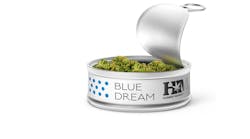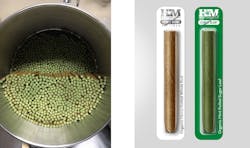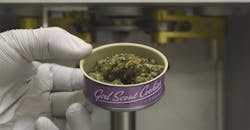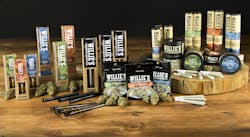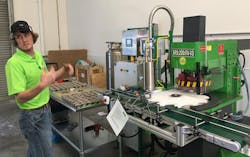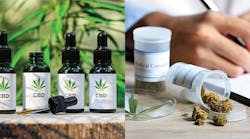The only thing growing, distributing, and selling cannabis used to lead to was prison time. Now it's becoming just as legitimate an industry as it was when our first president George Washington cultivated it on his Mount Vernon homestead.
Of course, he grew hemp for mooring ropes, clothing, and such, while today's growers harvest it to reduce cancer patients' nausea and your brother's boredom, but nonetheless, it's a legitimate way to earn a living. Mostly.
The psychoactive herb remains illegal on the federal level, though 27 states exercise the tenth amendment to allow medicinal use. And after this past election, recreational use is—or soon will be—permitted in seven of those states, as well as Washington D.C., where our federal laws are occasionally made.
If you grow pot, your market is at least one in every five Americans. Then tack on all the tourists that visit California, which included 17 million international visits in 2015. Don't forget to add all the hedonists who stay in Las Vegas. There were 42 million of them in 2015. So the outlook is incredibly, uh, high (I wish I could tell you that's the last pun, I really do).
Projected sales for legal marijuana could reach nearly $23 billion by 2020, according to ArcView Market Research. (Sales came in at $25 billion in 2021 (12/17/22))
That's an enticing figure for investors like Serge Chistov, who financially backs the full-scale manufacturing operation at Honest Marijuana Co. in Oak Creek, Colorado, an unspoiled Rocky Mountain hamlet off the beaten path and exactly the type of place one would expect a craft cannabis operation.
What you may not expect are the same highly efficient, technologically advanced packaging practices found in the food and beverage industry.
"We look at our buds as a gentle flower from beginning to end," Chistov says. "So they are put in hollow cans by hand, then go to a semi-manual injection of liquid nitrogen to push out the oxygen right before getting canned."
Honest Marijuana, founded by 26-year-old Anthony “Ant” Franciosi still uses organic agricultural methods and sustainable practices, yielding up to 160 pounds per month. To keep the lovingly tended-to buds preserved for the consumer, the company forgoes baggies and uses nitrogen-sealed metal cans for the fluffy, crystal-covered whole buds, and nitrogen-flushed blister packaging, like a toothbrush would come in, for individual blunts.
Cigar shops wouldn't throw a hand-rolled Cohiba in a mason jar by the register; they'd store it in well-maintained humidors. It's the same theory here but in disposable storage.
Chistov thinks Craft cannabis should take the same care in preservation, even if their grass-fed cigarillos (blunts) are rolled in modified cigarillo machines, at a rate of 700 to 900 per hour, before a conveyor takes them to the nitrogen-flushing blister machine made by Mactec Packaging.
This nitrogen-sealed canning, patented by N2 Packaging Systems, is similar to the process used to keep ammunition indefinitely fresh for a potential zombie apocalypse, as well as preserving food. Replacing oxygen with inert gas keeps everything from potato chips to crackers fresh and crunchy for several months to years.
And now that weed can be preserved the same way as munchies, consumers can expect a consistent product and stable pricing, which are fairly low standards for any other industry.
Quality Assurance
Quality is everything to Chistov, a successful vodka importer who may have been a doctor if not for the Soviet Union's collapse. His intense understanding of human physiology and acumen for distributing the distilled spirits that alter it perfectly segue into the blunt businessman's latest venture.
Chistov knows from his work distributing Exclusiv Vodka—a low-price, high-value spirit, from Moldova—that in a competitive industry, where brand matters, the consumer must receive the same experience each time.
"Eighty-five percent of our GDP depends on me going and spending on things that satisfy me," Chistov says. "How the hell do you expect me to walk into a store and not receive the same exact experience as I had last week?"
He says that as legalization expands, people's expectations don't because they're just excited to have access. Essentially, they're just happy to get high—and even happier after. Receiving a reproducible experience has become an afterthought.
He thinks the higher standards pot manufacturers hold themselves to should be found in every aspect of the product, not just the THC content.
"If you buy a bottle of wine and like it, and the next day come in and get something completely different?" Chistov asks. "No industry in the United States would do that. You'd get punched in the nose. The experience must be reproducible."
This may have been acceptable before when production took place behind the false wall of some nondescript shell business and the supply chain comprised various smugglers transporting bricks of compacted chronic in the tire well of their trunk. But why now?
In certain states, a 21-year-old can walk into a dispensary and get whatever you want, up to an ounce per day, as they can a grocery store and grab a bottle of Cabernet boxed wine or case of beer.
The difference is beer and winemakers have innovated methods over centuries to bottle and store their spirit-lifting liquids. Glass beer bottles have UV coating, while Guinness invented their signature floating widget so Guinness poured from the can retains that creamy head found at the pub.
Meanwhile, dispensary pot is often stored in glass jars and sold in plastic bags and prescription bottles.
"The marijuana industry claims itself to be green and responsible, but it's still dealing with plastic baggies," Chistov says. "Packaging hasn't been part of the consideration for a lot of manufacturers. Many people are too busy figuring out the right soil mixtures, and what pesticides and nutrients to use."
Again going back to his vodka experience, he compares this with cheap and high-end liquor, each having its own niche to fill. In between is a battleground for companies like his, and he hopes Honest Marijuana's technological advantage will someday turn this small craft operation.
Chistov compared his model to Tito's Vodka. The Austin-based handmade distiller started small, and grew to a nationally known brand, earning $61 million in sales in 2015, (the overall vodka industry is $7.3 billion in 2021).
"We're small batch like Tito's at the beginning of the endeavor," he says. We put a lot of heart into it and we're not looking to become Budweiser."
Canning Cannabis
"When oxygen levels can be dropped below 2 to 3%, the number of deleterious oxidation reactions in stored product can be greatly decreased resulting in longer palatability and nutritional shelf lives," says Mike Standlee, an investor in N2.
"This process has been used in the food industry for years and proven."
Where weed is concerned, the flushing eliminates moisture and prevents oxidation of the plant.
"Degradation of cannabis is a huge problem," says Scott Martin, CEO of N2 Packaging. The packaging company out of Arizona, where pot is medically legal, bridges the distribution disconnect between the grower and dispensary and ultimately, the end-user. "
"As more states go recreational, more cultivation comes into play," Martin says. "Then oversupply and preservation become an issue."
Outdoor growers all harvest the crop at the same time, and they all go to market at the same time, this creates price fluctuations and economic uncertainty. Being able to preserve and store until supply drops and prices rise would be a considerable advantage.
On the dispensary side, the Afghani Kush and White Widow harvested recently may sit in jars or bags, on shelves and hanging from hooks, waiting for someone to bring them home for the holidays—or to the IMAX to check out Rogue One. All the while, potency and value slip away.
Using an "N2 My Fresh Can" hold it all in, possibly even for two years. Martin says current testing is being conducted to verify the actual shelf-life.
The effects already have their clients buzzing.
"We're working with a guy who has 13 dispensaries in Sacramento," Martin says.
"When he brings in new product, he'd put it on the right side of his display. Every seven days he moves it to the left and drops it $10 and so on until the product is gone. Now he's changed his entire business model, going with the prepackaged cans. He just puts it on the shelf. His customers understand it's consistent, it's quality, it's going to be the same experience every time."
Along with shelf-life, this packaging method allows for labeling opportunities that further drive home this came from a legitimate grower. Or at least, gives that perception. If your mom ever tried pulling a stunt like bringing home generic bottom-shelf bagged cereal that she says tastes just like regular Fruit Loops, you know what I'm talking about. No cartoon toucan, no prize: no dice.
Would you rather buy weed in a baggie, like a teenager, or in a can with a pull-off ring that bears the label of "Willie's Reserve," Willie Nelson's line of cannabis products?
"Branding and building a brand comes to long-term viability," says Martin, who can provide the full labeling application as well to allow manufacturers to stand out. "It's not just producing product and delivering to stores in bags."
Having a recognized brand that people seek out will be the difference, Martin says, although at first growers he approached were reluctant to "put cannabis in a cat food can."
Business has picked up considerably in the last six months, and with California voting to go full-baked, it doesn’t look like it will cool off.
Martin says banks are still resistant to the industry, so getting money for equipment investments is difficult. The company has to build each system on demand, which they lease to the manufacturer, making money by supplying the cans, which hold 0.125, 0.25, and 1 oz., respectively.
N2 not only invented the process for nitrogen-sealing Level 1, 2, and 3 Controlled Substances and a two-part, child-resistant, and senior-friendly lid, the first of its kind for a seam-roll can, CEO Scott Martin says.
The modified manual Rooney can seamer that N2 Packaging leases to Honest Marijuana could nitrogen-seal about 10 cans per minute. Their automatic versions can do 60 cans per minute.
"The roadblock to us ever being industrialized is the ability to fill the cans," says Martin. It takes 10 to 15 people to fill the cans to keep up with 30 per minute, so Martin is looking into ways to automate the process.
For now, educating the consumer that the process actually does something seems to be the immediate challenge to overcome.
Higher Learning
Chistov knew the risks when deciding to back Honest Marijuana. Due to persistent pop culture stereotypes, there's a stigma to cannabis cultivation and those associated with it.
"To some, it's still a bunch of long-haired guys violating the quietness of a beautiful neighborhood by gathering together and smoking pot," Chistov says. "It's not there anymore—if it ever was."
It has the potential to be big for business and bigger for the government. In 2015 Colorado collected $70 million from pot sales tax, compared to $42 million from alcohol.
But the biggest winners will be who can explain why their bud is better, in the way Gatorade sold people on electrolytes.
Honest Marijuana goes into great detail about the differences between strains, different cannabinoids (the chemicals that act upon your neurotransmitters creating various "highs"), and how oxidation can affect the synergy of these cannabinoids, or the entourage effect.
Basically, each strain looks different, smells different, and affects the user differently. And if it's stored in less-than-ideal conditions, could cause more changes to the consumable, much like oxidation can ruin a fine wine.
And Honest Marijuana takes it's product as seriously as a Napa Valley winery would.
"There's no reason to grow it as good as we do if you're not going to preserve those volatile components of that plant that make each one of them so unique," Chistov says.
Cigar shops wouldn't throw a hand-rolled Cohiba in a mason jar by the register; they'd store it in well-maintained humidors. And Chistov thinks craft cannabis should take the same care in preservation, even if their grass-fed cigarillos (blunts) are rolled in modified cigarillo machines, at a rate of 700 to 900 per hour, before a conveyor takes them to the nitrogen-flushing blister machine made by Mactec Packaging.
"There's a lot of lazy people out there looking for a quick buck, and they're getting it," Chistov says.
"We definitely see people out there concerned with nothing else but the quick turnaround and a low margin. I'm building for the future. I simply cannot accept that as a responsible manufacturer."










